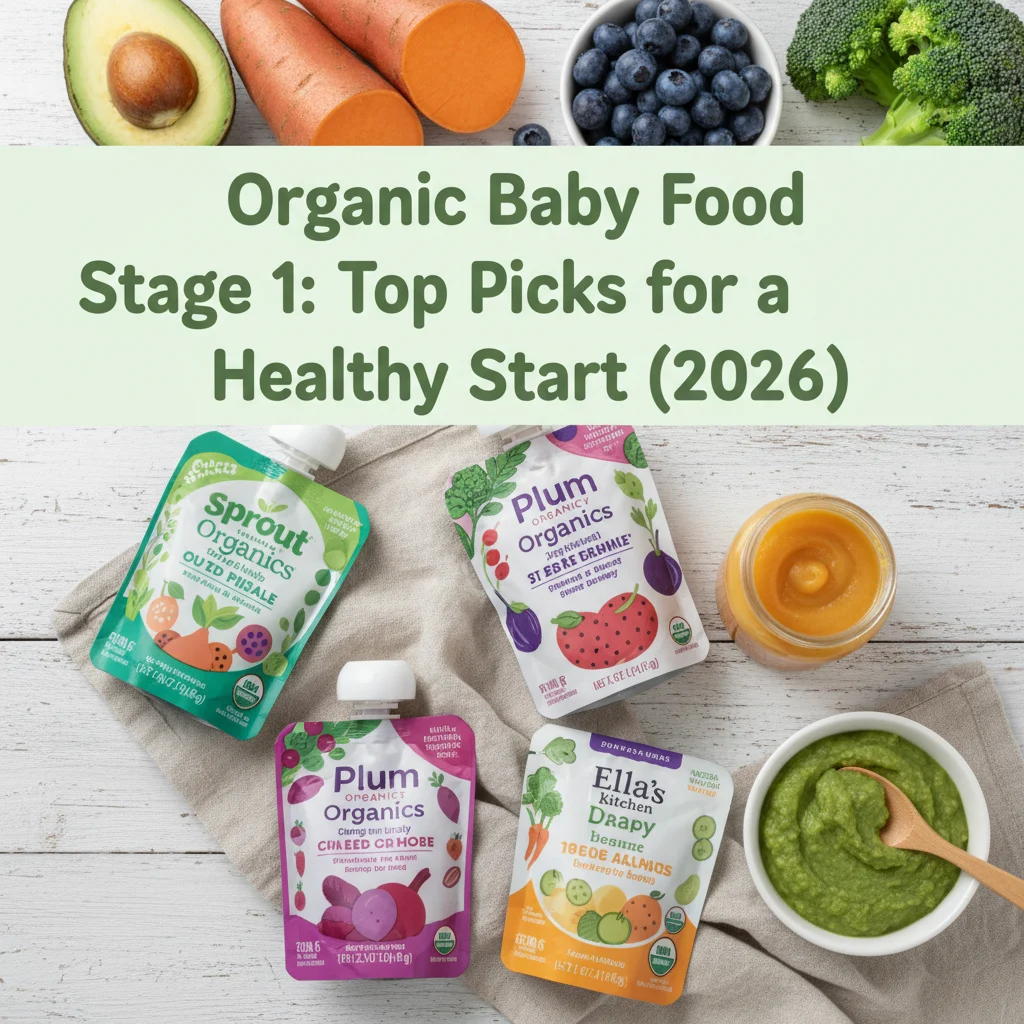[Get the best value organic baby food stage 1 on Amazon today!]
# Organic Baby Food Stage 1: Top Picks for a Healthy Start (2026)
Starting your little one on solid foods is a huge milestone! It’s exciting, messy, and sometimes a little overwhelming. You want to give your baby the very best start, and that often means choosing organic options. But with so many brands and flavors of stage 1 baby food out there, how do you pick the right ones? Don’t worry, we’ve done the research for you!
In this guide, we’ll dive into our top picks for organic baby food stage 1 in 2026, ensuring your baby gets the nutrients they need without any unwanted additives. We’ve considered factors like ingredients, texture, taste (yes, we tried them!), and ease of use to bring you this comprehensive list. Let’s get started on this delicious journey!
**Top Picks Summary**
| Product | Best For |
| —————————————— | ————————————- |
| Once Upon a Farm Organic Stage 1 Blends | Variety of Flavors & Clean Ingredients |
| Gerber Organic 1st Foods Single-Grain Oatmeal | First introduction to grains |
| Beech-Nut Organics Stage 1 | Budget-friendly option |
### Once Upon a Farm Organic Stage 1 Blends
**Best For:** Variety of Flavors & Clean Ingredients
**Key Features:**
* **Cold-Pressured:** This process preserves nutrients and flavor without the need for heat.
* **Organic Ingredients:** Made with certified organic fruits and vegetables.
* **Dairy-Free and Gluten-Free:** Suitable for babies with sensitivities.
* **Unique Flavor Combinations:** Offers a wide range of interesting and delicious blends.
**Why We Like It:**
Once Upon a Farm really stands out because of their commitment to freshness and quality. The cold-pressured process ensures that the nutrients are locked in, and the unique flavor combinations introduce your baby to a wider range of tastes early on. We also appreciate that they cater to common allergens, making it a worry-free choice for many parents. They are also easy to find online or in stores.
### Gerber Organic 1st Foods Single-Grain Oatmeal
**Best For:** First introduction to grains
**Key Features:**
* **Iron-Fortified:** Provides essential iron for healthy development.
* **Single-Grain:** Easy to digest and less likely to cause allergic reactions.
* **Organic Oats:** Made with certified organic whole grain oats.
* **Smooth Texture:** Perfect for babies just starting on solids.
**Why We Like It:**
Gerber is a trusted brand for a reason, and their Organic 1st Foods Single-Grain Oatmeal is a fantastic option for introducing grains. The iron fortification is a major plus, and the single-grain formula minimizes the risk of allergies. The smooth texture is gentle on your baby’s developing digestive system, making it a comfortable and nutritious choice. It is also widely available.
### Beech-Nut Organics Stage 1
**Best For:** Budget-friendly option
**Key Features:**
* **Simple Ingredients:** Focuses on single fruits and vegetables.
* **Organic Certified:** Made with certified organic ingredients.
* **Affordable:** A more budget-friendly option compared to some other brands.
* **Wide Availability:** Easy to find in most grocery stores.
**Why We Like It:**
Beech-Nut Organics Stage 1 is a great choice for parents who want organic options without breaking the bank. They offer a variety of single-ingredient purees, allowing you to introduce your baby to different flavors one at a time. The simplicity of the ingredients makes it easy to identify any potential allergens, and the affordability makes it accessible to more families.
[Browse top-rated organic baby food stage 1 on Amazon]
## Buying Guide: Choosing the Best Organic Baby Food Stage 1
Choosing the right organic baby food stage 1 can feel overwhelming, but breaking down the key factors will make the process much easier. Here’s what to consider:
**1. Ingredients:**
* **Organic Certification:** Look for the USDA organic seal to ensure the food meets strict organic standards. This means no synthetic pesticides, herbicides, or fertilizers were used in the growing process.
* **Single vs. Mixed Ingredients:** Start with single-ingredient purees to identify any potential allergies. Once you’ve ruled out allergies, you can introduce mixed blends for a wider range of nutrients and flavors.
* **No Added Sugar or Salt:** Babies don’t need added sugar or salt. Check the ingredient list and nutrition facts panel to make sure these aren’t included.
* **No Artificial Flavors or Preservatives:** Opt for baby food that is free from artificial flavors, colors, and preservatives.
**2. Texture:**
* **Smooth Puree:** Stage 1 baby food should have a smooth, thin texture that is easy for babies to swallow. Avoid products with chunks or lumps.
* **Consistency:** The consistency should be uniform throughout the puree.
**3. Nutritional Value:**
* **Vitamins and Minerals:** Look for baby food that is rich in essential vitamins and minerals, such as vitamin A, vitamin C, and iron.
* **Fiber:** Fiber is important for healthy digestion. Look for purees made with fruits and vegetables that are naturally high in fiber.
**4. Packaging:**
* **Convenience:** Consider the packaging format. Pouches are convenient for on-the-go feeding, while jars may be more economical.
* **BPA-Free:** Make sure the packaging is BPA-free to avoid any potential health risks.
* **Resealable:** Resealable pouches or jars are ideal for storing leftovers.
**5. Brand Reputation:**
* **Research:** Research different brands of organic baby food and read reviews from other parents.
* **Transparency:** Choose brands that are transparent about their ingredients and manufacturing processes.
* **Recall History:** Check for any past recalls of the brand’s products.
**6. Allergies:**
* **Common Allergens:** Be aware of common allergens, such as milk, eggs, peanuts, tree nuts, soy, wheat, fish, and shellfish. Introduce new foods one at a time and watch for any signs of allergic reaction.
* **Allergen-Free Options:** If your baby has allergies, look for baby food that is specifically labeled as allergen-free.
**7. Taste:**
* **Variety of Flavors:** Introduce your baby to a variety of flavors to help them develop a palate for healthy foods.
* **Natural Flavors:** Choose baby food that tastes like the fruits and vegetables it’s made from. Avoid products with artificial flavors that can mask the natural taste of the food.
**8. Price:**
* **Budget-Friendly Options:** Organic baby food can be more expensive than conventional baby food. Look for budget-friendly options that still meet your quality standards.
* **Bulk Buying:** Consider buying in bulk to save money.
**9. Expiration Date:**
* **Freshness:** Always check the expiration date before buying baby food.
* **Storage:** Store baby food properly to maintain its freshness and quality.
By considering these factors, you can confidently choose the best organic baby food stage 1 for your little one, ensuring they get a healthy and nutritious start to solid foods.
### Understanding Stage 1 Baby Food: What You Need to Know
Stage 1 baby food is specifically designed for babies who are just starting to eat solid foods, typically around 4-6 months of age. It’s all about introducing simple, easy-to-digest foods in a way that supports their developing digestive system.
**Key Characteristics of Stage 1 Baby Food:**
* **Smooth Texture:** As mentioned earlier, the texture is crucial. Stage 1 foods are pureed to a very smooth consistency, almost liquid-like, making it easy for babies to swallow without choking.
* **Single-Ingredient Focus:** Most stage 1 foods consist of a single fruit or vegetable. This allows parents to introduce new flavors one at a time and easily identify any potential allergic reactions. Common options include sweet potatoes, carrots, peas, apples, bananas, and pears.
* **Nutrient-Rich:** Stage 1 foods are packed with essential vitamins and minerals that support your baby’s growth and development.
* **Easily Digestible:** The pureed texture and simple ingredients make stage 1 foods easy for babies to digest.
* **Unseasoned:** Stage 1 foods are typically unseasoned, allowing babies to experience the natural flavors of the food.
**Why Stage 1 is Important:**
* **Introduction to Solid Foods:** Stage 1 marks the beginning of your baby’s journey into the world of solid foods.
* **Allergy Identification:** Introducing single-ingredient foods makes it easier to identify any potential allergies.
* **Development of Taste Preferences:** Exposing your baby to a variety of flavors early on can help them develop a palate for healthy foods.
* **Nutritional Support:** Stage 1 foods provide essential nutrients that support your baby’s growth and development.
* **Development of Oral Motor Skills:** Learning to eat solid foods helps babies develop their oral motor skills, which are important for speech development.
**Transitioning to Stage 2:**
Once your baby has successfully tried a variety of stage 1 foods and is showing signs of being ready for more texture, you can start to transition to stage 2 baby food. Stage 2 foods typically have a slightly thicker texture and may contain a combination of ingredients.
**Signs Your Baby is Ready
[Check the latest prices and deals for organic baby food stage 1 on Amazon today!]









